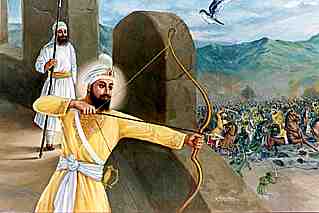SUBHASHITHANI:353
The lion king was indiscriminately killing animals for food . The weaker animals pleaded with the king that this is not according to niti shastras and that they will offer themselves voluntarily to the king every day and wanted the lion to leave them in peace. In the process the animals narrated to the king various duties of the king towards his subjects, some of which we saw in the previous blog. Slokas on 'Raja dharma' continues:
यथा गौर्दुह्यते काले पाल्यते च तथा प्रजाः ।
सिच्यते चीयते चैव लता पुष्पफलप्रदा ॥१.२४५॥
yathā
gaur duhyate kāle pālyate ca tathā prajāḥ |
sicyate cīyate caiva latā puṣpa-phala-pradā || 245 ||
Just as a cow is reared up and milked in time so are subjects
taken care of and made to give to the king his due. When a creeper is watered
and grows well it yields flowers and fruits.
यथा बीजाङ्कुरः सूक्ष्मः प्रयत्नेनाभिरक्षितः ।
फलप्रदो भवेत्काले तद्वल्लोकः सुरक्षितः ॥१.२४६॥
yathā
bījāṅkuraḥ sūkṣmaḥ prayatnenābhirakṣitaḥ |
phala-prado bhavet kāle tadval lokaḥ surakṣitaḥ || 246 ||
Just as the minute germ of a seed when
nourished with care yields fruit in time so do subjects when well protected.
हिरण्यधान्यरत्नानि यानानि विविधानि च ।
तथान्यदपि यत्किञ्चित्प्रजाभ्यः स्यान्महीपतेः ॥१.२४७॥
hiraṇya-dhānya-ratnāni
yānāni vividhāni ca |
tathānyad api yat kiñcit
prajābhyaḥ syān mahīpateḥ || 247 ||
Gold, grains, gems, vehicles of various types and many other
things of that sort, a king obtains from his people.
लोकानुग्रहकर्तारः प्रवर्धन्ते नरेश्वराः ।
लोकानां सङ्क्षयाच्चैव क्षयं यान्ति न संशयः ॥१.२४८॥
lokānugraha-kartāraḥ
pravardhante nareśvarāḥ |
lokānāṃ saṅkṣayāc caiva kṣayaṃ
yānti na saṃśayaḥ || 248 ||
Kings who bestow favours on the people prosper, while they
meet with ruin if they harass the subjects. There is no doubt about this.
भूमिर्मित्रं हिरण्यं च विग्रहस्य फलत्रयम् ।
नास्त्येकमपि यद्येषां न तं कुर्यात्कथञ्चन ॥१.२४९॥
bhūmir mitraṃ hiraṇyaṃ ca
vigrahasya phala-trayam |
nāsty ekam api yady eṣāṃ na
taṃ kuryāt kathañcana || 249 ||
The
acquisition of land, an ally, or gold (wealth)-these are the three fruits of
war. When any one of these is not to be obtained one should not make war under
any circumstances.
यत्र न स्यात्फलं भूरि यत्र चस्यात्पराभवः ।
न तत्र मतिमान् युद्धं समुत्पाद्य समाचरेत् ॥१.२५०॥
yatra na syāt phalaṃ bhūri
yatra casyāt parābhavaḥ |
na tatra matimān yuddhaṃ
samutpādya samācaret || 250 ||
When the gain is not very great and where defeat is certain -there a wise man should not act in such a way as to give rise to war.
यत्कृत्यं सिध्यति राज्ञां दुर्गेणैकेन विग्रहे ॥१.२५१॥
Yatkrutyam sidyati raagyaam durgenakna vigrahe II251
तस्माद्दुर्गं प्रशंसन्ति नीतिशास्त्रविचक्षणाः ॥१.२५२॥
Tasmat durgam prasamsanti neeti shastra vichakshanaah II252
पुरा गुरोः समादेशाद्धिरण्यकशिपोर्भयात् ।
शक्रेण विहितं दुर्गं प्रभावाद्विश्वकर्मणः ॥१.२५३॥
Puraa guroh
samaadeshaad hiranyaasipor bhayaat I
Shakrena
vihita durgam prabhaavaat visvakarmanh II253
Formerly
Indra, for fear of Hiranya kasipu, at the advice of his preceptor, had a fort
built for him through divine power of Visva karma.
तेनापि च वरो दत्तो यस्य दुर्गं स भूपतिः ।
विजयी स्यात्ततो भूमौ दुर्गाणि स्युः सहस्रशः ॥१.२५४॥
Tenaapi cha
varo datto yasya durgam sa bhupatih I
Vijayee syaat
tato bhumau durgaani syuh sahasrasah II254
Indra
pronounced a blessing that any king who built a fortress should conquer his
enemies. That is why there are so many forts abound.
दंष्ट्राविरहितो नागो मदहीनो यथा गजः ।
सर्वेषां जायते वश्यो दुर्गहीनस्तथा नृपः ॥१.२५५॥
Dumshtraa
virahito naago madaheeno yatha gajah I
Sarveshaam
jaayate vashyo durgaeens tatha nrupah II255
Like a
snake with venom-less fang, and an elephant without rut, a king without a
fortress falls in to the power of his foes.

No comments:
Post a Comment